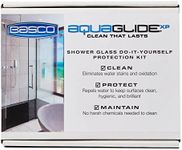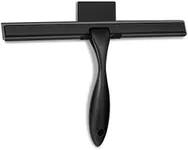Buying Guide for the Best Glass Shower Door Cleaners
Choosing the right glass shower door cleaner can make a big difference in keeping your bathroom looking fresh and sparkling. The main goal is to find a cleaner that effectively removes soap scum, hard water stains, and mildew without damaging the glass or surrounding surfaces. When shopping, it's important to consider how easy the product is to use, how safe it is for your family and the environment, and whether it matches your cleaning habits and needs. Understanding the key features will help you pick a cleaner that fits your lifestyle and keeps your shower doors crystal clear.Cleaning PowerCleaning power refers to how effectively the product removes tough stains like soap scum, hard water spots, and mildew from glass surfaces. This is important because a cleaner with strong cleaning power will save you time and effort, leaving your shower doors spotless. Cleaners can range from light-duty, which are good for regular maintenance and light buildup, to heavy-duty, which are designed for stubborn stains and infrequent cleaning. If you clean your shower doors often, a light-duty cleaner may be enough. If you deal with tough buildup or clean less frequently, a heavy-duty option might be better.
Safety and IngredientsSafety and ingredients refer to what the cleaner is made of and whether it contains harsh chemicals. This is important because some cleaners can be irritating to your skin, eyes, or lungs, and may not be safe for children or pets. Cleaners can be divided into chemical-based and natural or eco-friendly options. Chemical-based cleaners often work faster on tough stains but may have strong odors or require ventilation. Natural cleaners use plant-based or biodegradable ingredients and are gentler on your health and the environment, though they may require more scrubbing. If you have sensitivities or prefer a greener home, look for natural or non-toxic options.
Ease of UseEase of use describes how simple and convenient the cleaner is to apply and rinse off. This matters because a product that's easy to use will encourage you to clean more regularly and with less hassle. Some cleaners come in spray bottles for quick application, while others may be gels or concentrates that need to be diluted. Ready-to-use sprays are best for quick, everyday cleaning, while concentrates can be more economical for larger jobs but require extra steps. If you want a fast and simple routine, choose a spray; if you don't mind a little extra work for a deeper clean, a concentrate or gel might suit you.
Surface CompatibilitySurface compatibility means whether the cleaner is safe to use on all the materials in your shower, such as glass, metal frames, tiles, or plastic seals. This is important because some cleaners can damage or discolor certain surfaces. Cleaners are often labeled as safe for glass only, or for multiple surfaces. If your shower has a mix of materials, look for a multi-surface cleaner to avoid accidental damage. If your main concern is just the glass, a glass-specific cleaner will do the job.
Residue and StreaksResidue and streaks refer to whether the cleaner leaves behind any film or marks after use. This is important because a good cleaner should leave your glass clear and shiny, not cloudy or streaky. Some cleaners are formulated to be streak-free, while others may require extra rinsing or wiping. If you want a spotless finish with minimal effort, look for products that promise a streak-free or no-residue result. If you don't mind a little extra buffing, you may have more options to choose from.
ScentScent refers to the fragrance left behind by the cleaner. This matters because strong chemical smells can be unpleasant or irritating, especially in small bathrooms. Cleaners can be unscented, lightly scented, or have strong fragrances. If you are sensitive to smells or prefer a neutral bathroom environment, choose an unscented or mildly scented product. If you enjoy a fresh or clean scent after cleaning, look for a fragrance you like.


















